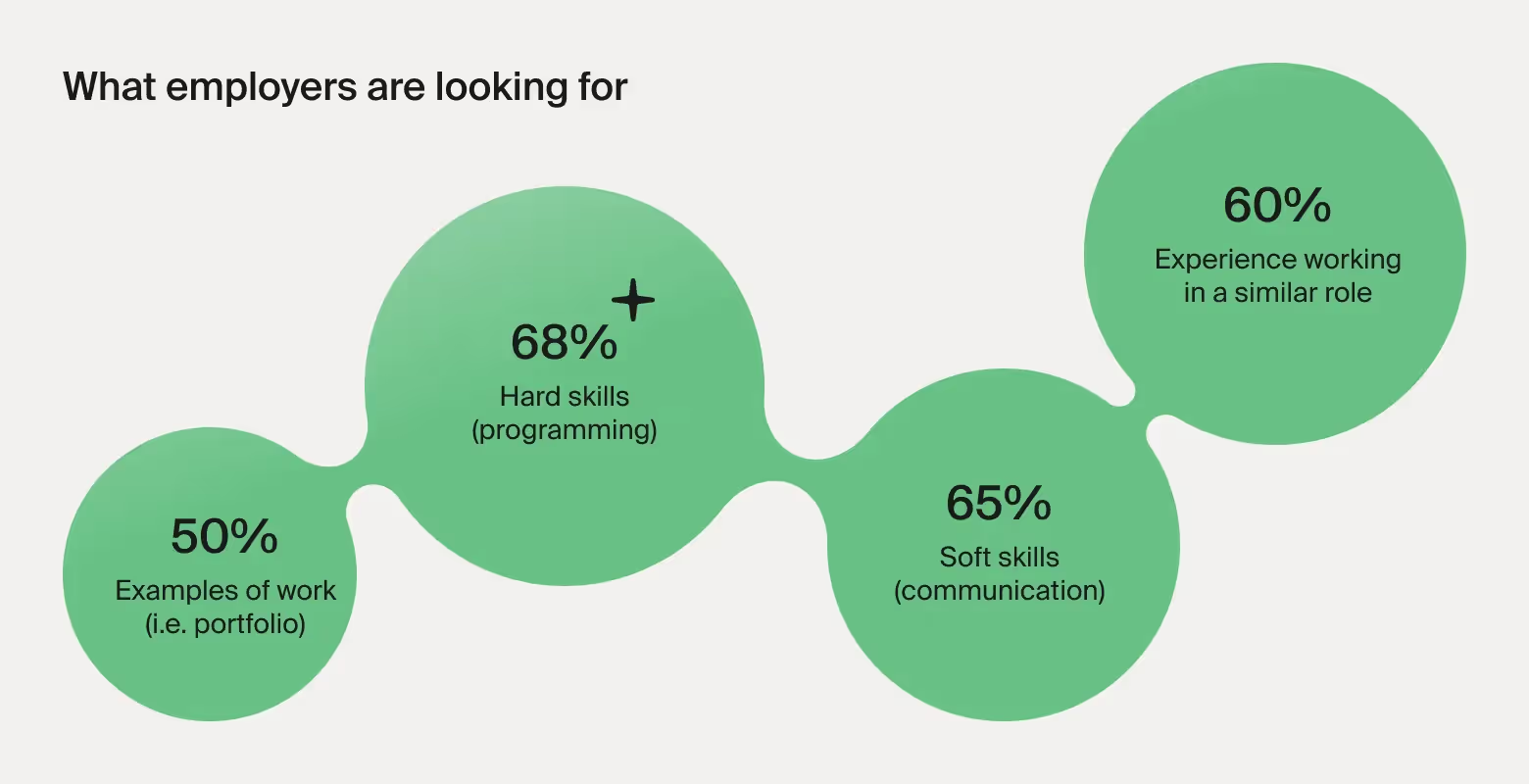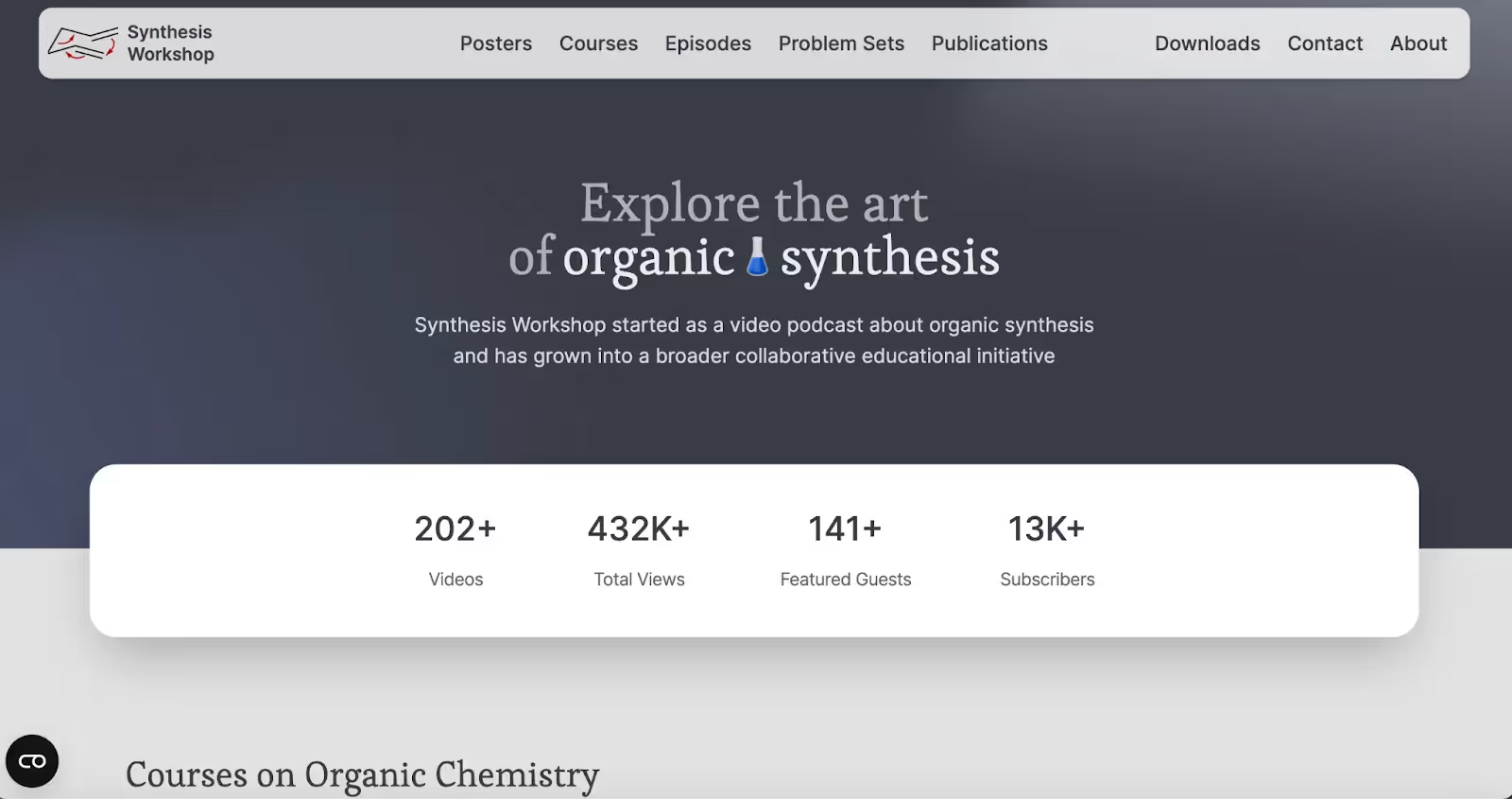
Yes, you can afford a bootcamp. There’s our anti-clickbait answer. One word, simple and confident: yes. Now, don’t get us wrong; bootcamps cost money. But there are numerous ways to pay for a coding bootcamp — income-based loans, installments, or even paying for it up front, just to name a few.
If you are dedicated to upgrading your career, you and the institution you choose can work together to find a way to get you the education you crave at a reasonable price.
So let’s dig into that. Here’s how to pay for a coding bootcamp and why it’s absolutely worth your money.
Can you afford not to join a bootcamp?
Usually, this section would come last. A typical article about financing your coding bootcamp education would start out presenting all the dry data. Credit scores, loan options, and more would dominate the discussion. And we’ll get to a full explanation about all that later, don’t worry.
But we want to start out by reminding you that an investment in a bootcamp is unlike any other you’ll make. In fact, affordability is a time-sensitive metric. Based on data from our Outcomes Report, not joining a bootcamp is actually the less affordable option if we consider the earning potential over time.
Here’s what we mean — take a look at this info on our Software Engineering Bootcamp grads.
Our Software Engineering grads came to us earning a median salary of $55,000, so we set that as the baseline for both the career switcher and the person staying put.
But in the first year following the pivot, the person switching sees their earnings skyrocket by $15,000 when they begin a new career in tech. In contrast, we estimated that the non-switcher would only increase their earnings by 3%, the average yearly raise.
Ah, but you caught us: we didn’t include the cost of the bootcamp itself in the stats. Let’s account for that. After all, the bootcamp isn’t free.
This assumes that the person who enrolled chose one of the most expensive ways to pay for the bootcamp: using our longest installment plan (prices current as of the writing of this article). For full transparency, there are loan options that can cost more, but we can’t give concrete data on their totals, as interest rates can differ case by case. For the sake of having hard numbers, we’ll be using the longest installment plan figures as our benchmark.
So, the hypothetical person who didn’t switch might be feeling pretty pleased with their decision to stay put. After all, in terms of return on investment, they increased their earnings by $1,650 by doing nothing. True, the bootcamp cost ends up covered by the salary increase, but in year zero, the education eats up all but $430 of the earnings boost (and we’re putting the costs in year zero for the sake of ease of comparison even if, indeed, the example is assuming an installment plan that will be covered over a longer timeframe).
To illustrate this, let’s give the person choosing to stay put the best chance of competing.
We’ll say that they change jobs every three years, earning a 20% increase with each new position. We’ll also give them a boost and say they switched jobs at year zero and earned a 20% raise instead of the average 3% raise we’ve been using above.
And we’ll leave the year zero earning potential for the switcher diminished by the bootcamp cost. After all, the bootcamp is an expense incurred only when shifting careers.
For a bit of explanation: we’re using the three-year switching schedule because it provides a good comparison to Glassdoor’s stats on software engineers and their earnings relative to their experience (data current as of the writing of this article).
So, explanation over. What does this look like?
Even with a 20% raise the first year and every three years thereafter, the person staying put doesn’t crack a six-figure salary until year seven. The person who switched to software engineering? They land six figures by year three. And yikes, y’all. The gulf in what that means in terms of total earnings is shocking.
The bars themselves don’t look all that striking until you realize that the difference between them totals to $216,695. That’s half the median price of a house.
This also assumes that you are the average person, which, of course, you aren’t. It doesn’t account for the fact that you could specialize and land a lucrative tech job that might even pay you up to $269,917.
See, education is an investment that doesn’t depreciate. The costs that bootcamp students incur at the start of their journey are more than repaid over their career. After that, the financial benefits only magnify.
But we’ll get off our soapbox. There’s a real world out there where things cost real money right now, we know. So let’s get into the actual nuts and bolts. The future’s promising. It’s just about getting over the first financial hurdle.
How to pay for a coding bootcamp
Just so we’re on the same page, we’re going to be using our Software Engineering program as the example for bootcamp costs. This will give you a sense of what the different payment options look like without overwhelming you with information. If you want more specifics on what different programs cost and the nuances of payment plans, you can find details on our FAQ page. With that out of the way, let’s talk about four common ways of covering bootcamp tuition.
Paying upfront
We’re not surprising anyone by including this, but it deserves mention. Paying upfront is by far the cheapest way to cover your bootcamp tuition — $11,350 for our Software Engineering program. By handling the cost in one lump sum, you can save a significant amount of money. In addition, this approach means you won’t have to potentially take on debt, which, depending on your situation, could be difficult or affect your credit score.
Installments
This breaks down the total cost into monthly payments made during and after your time at a bootcamp. If you choose to go for installments with our lending partner, Lumion, this schedule can last from 12 to 48 months.
This approach relieves immediate financial pressure, but ends up more expensive in the long run. Returning to our example: for the longest 48-month installment plan, the initial deposit would be $750, and the monthly payment would be $288, but the total cost for the Software Engineering program would grow to $14,570. Going for shorter installment plans would lower this total cost.
Loans
If you’re familiar with student loans, then you’ll likely have no problem grasping bootcamp loans. The one caveat we’ll add here is that the debt you take on with these loans is far less than the debt you’d assume to cover tuition at a four-year institution.
For our Software Engineering program, the total base cost with loans arranged through Climb or Ascent would be $14,570. However, like we hinted at above, this might not be the total amount you’d end up paying, as interest will accrue, and the exact amount will depend on your specific situation. Still, this is significantly lower than the average $38,375 of student debt people take on for college.
So this might be the way to go if your credit is solid and you’re confident in your ability to make monthly payments.
Income-based loans
These come in multiple forms, but the basic philosophy of this method of financing a bootcamp education is that the bulk of the payment will start only once you land a job meeting certain criteria. Some of these contracts might come with requirements to make smaller payments during your time studying as well.
Now, that sounds fairly similar to installments and loans so far, so we’ll just underline the key difference: the vast majority of this payment will be contingent on the job you get once you graduate. The specific amount will be based on the fixed percentage of your salary that you agree to pay after landing a job and the period over which you agree to pay it. In addition, some of these income-based loans can accrue interest.
This means that you’ll spend relatively little to gain the education to make a career pivot. In addition, this setup incentivizes bootcamps to ensure their students get jobs. After all, grads will only start tackling the bulk of the payment once they get a job meeting the stipulated criteria. However, the percentage and period can combine to lead to you paying far more than you expected.
This is a fairly complex topic, so we encourage you to read more about it to see if it’s right for you.
What your tuition covers
At a bootcamp, students pay for much, much more than just professional education. Yes, gaining programming chops is key to the experience. But there’s so much more included, too. For example, rather than just giving students know-how in hard skills such as coding, good bootcamps include training in soft skills as well.
After all, as shown by our employer report that surveyed over 1,000 decision makers, 68% of respondents said that hard skills were paramount for an applicant’s success. Just behind that, 65% said soft skills were also crucial.

So we teach both. In our Software Engineering Bootcamp, industry experts teach in-demand skills in JavaScript, for example. Then we structure learning to simulate the environment of working in tech, which, by design, allows students to acquire soft skills such as communication, teamwork, and problem solving.
It doesn’t stop there, though. This investment can even get you your first experience in tech via externships. These are real-life tech projects that you can apply to join as your time with the bootcamp closes.
Through them, you’ll learn what it’s like to work in tech first-hand, and you’ll lock in the first entry in your tech portfolio. (Protip: According to our Employer Survey, a strong portfolio is something that goes a long way in convincing employers you’re a good hire.)
And frankly, they’re just cool. Our students built a dashboard that’s helping Boston Public Library better understand traffic to more effectively schedule events and staff hours. Students also rebuilt a website for Synthesis Workshop, a platform making science content more accessible, and made navigation a breeze. And then they also helped refine the user journey for Kippy, an AI-powered language-learning app.

A money back guarantee guarantee
There’s one last thing to mention as we talk about if you can afford a bootcamp: our money back guarantee. Good bootcamps offer this as a token of confidence in the services we provide.
With us, landing a job is the focus. If you finish the bootcamp, follow the advice we give, adhere to a set of guidelines, and don’t find a relevant role within 10 months, we’ll refund the full cost of your bootcamp.
We will note here: 82% of TripleTen grads do land jobs within 10 months of finishing the program. So your likelihood of needing this guarantee is low. Still, our guarantee means that your investment is safe.
So, can you afford it? The options are either a lucrative career pivot or your money back. That sounds pretty affordable to us.
See if a bootcamp is right for you
If you want to make sure that a bootcamp will be the best way for you to gain new tech skills to make a career change, we’ve got just the thing for you. Discover if a bootcamp is right for you by taking our self-assessment quiz.


.avif)



.avif)
.avif)
%20(2).avif)






.webp)





.avif)

